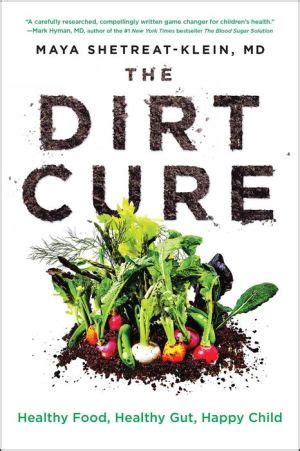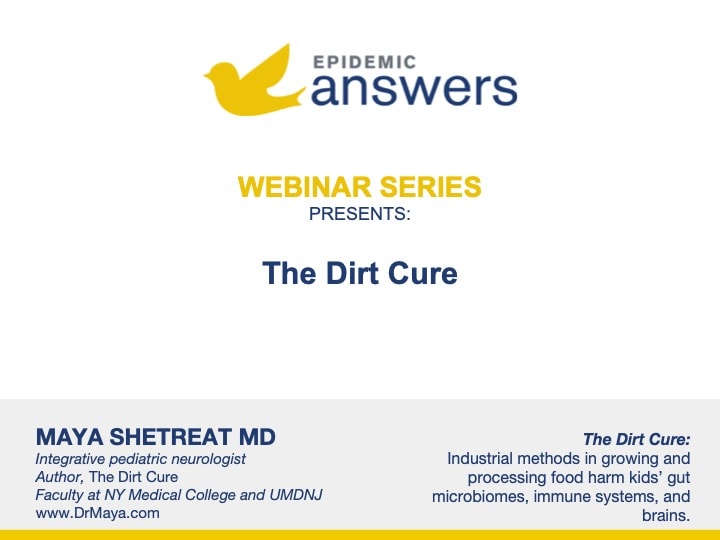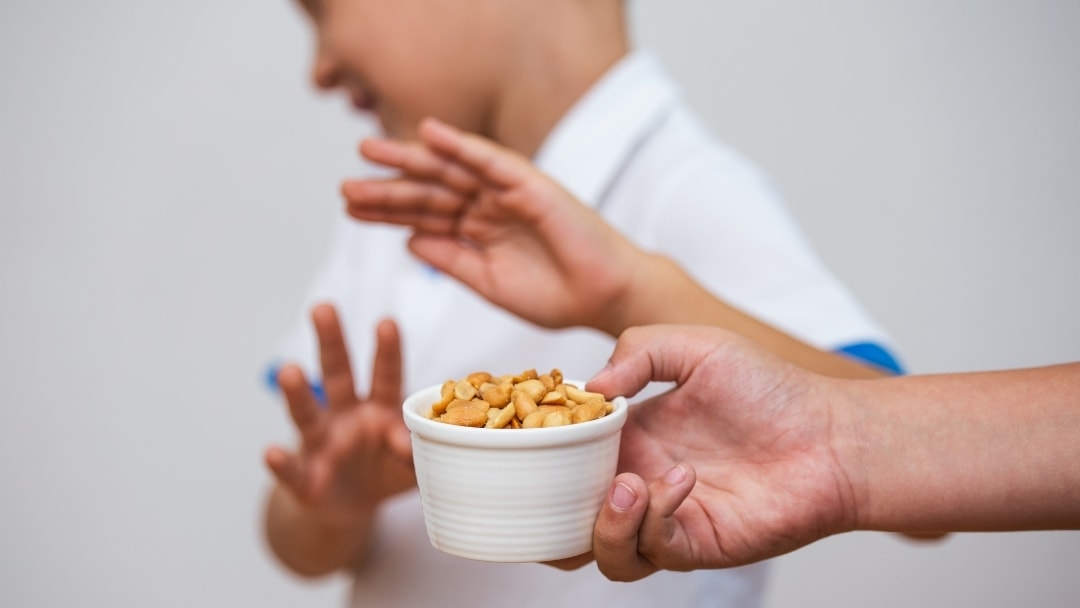In this blog post, Maria Rickert Hong explains the importance of soil microbes to our gut microbiome and health.
Why Are Soil Microbes Important?
Kids who live and work on farms have far less allergies, asthma and autoimmune disorders. Researchers theorize that this is due to exposure to a wider variety of soil microbes, both beneficial and pathogenic bacteria, fungi, parasites and viruses. In today’s too-clean environment, our kids lack access to these microbes that can both train the immune system how to fight and give it the tools it needs to fight. This is known as the hygiene hypothesis of allergies.
A healthy gut microbiome is essential for the normal development and function of the immune system. An unhealthy gut is a common cause of autoimmune disorders, of which I include autism and ADHD.
An unhealthy gut typically means that there is some form of gut dysbiosis, which means that the bad (pathogenic) guys outweigh the good (probiotic) guys. Common causes of gut dysbiosis include:
- Antibiotics
- GMO foods
- Low stomach acid
- Steroids
- NSAIDs such as ibuprofen
- Birth control pills
- Birth via C-section
- Lack of breastfeeding
- Passage from mother to newborn as the baby goes through the birth canal
Most of the immune system lies in the gut, and if there is gut dysbiosis, then immune dysregulation typically develops.
How to Correct Gut Dysbiosis
One way to counter gut dysbiosis is to supplement with probiotic bacteria and yeast. Look for a multi-strain blend that includes a high number of CFU (colony forming units), is refrigerated and, if possible, includes soil-based organisms such as Bacillus coagulans and Bacillus subtilis. These types of probiotics have been documented to improve diarrhea, constipation, intestinal motility and abdominal bloating and pain (see Sources & References below).
Eating fermented foods and implementing a gut-healing diet such as the GAPS (Gut And Psychology Syndrome), SCD (Specific Carbohydrate Diet), Paleo or Body Ecology Diet are other ways to heal the gut.
In addition, getting your child out in nature and exposed to a wide variety of microbes found in dirt and on plants can help train and reinforce his immune system.
About Maria Rickert Hong CHHC
Maria Rickert Hong is a Co-Founder of, and the Education and Media Director for, Epidemic Answers, the 501(c)3 sponsoring non-profit of The Documenting Hope Project.
She is a former sell-side Wall Street equity research analyst who covered the oil services sector at Salomon Smith Barney and Lehman Brothers under Institutional Investor #1 ranked analysts. Later, she covered the gaming, lodging & leisure sector at Jefferies & Co. and Calyon Securities. She quit working on Wall Street when her first son was born.

Prior to working on Wall Street, she was a marketing specialist for Halliburton in New Orleans, where she also received her MBA in Finance & Strategy from Tulane University.
She is the author of the bestselling book Almost Autism: Recovering Children from Sensory Processing Disorder and the co-author of Brain Under Attack: A Resource for Parents and Caregivers of Children with PANS, PANDAS, and Autoimmune Encephalitis. Maria is also a Certified Holistic Health Counselor. Her work can be found on EpidemicAnswers.org, DocumentingHope.com, Healing.DocumentingHope.com, Conference.DocumentingHope.com and MariaRickertHong.com
Still Looking for Answers?
Visit the Epidemic Answers Practitioner Directory to find a practitioner near you.
Join us inside our online membership community for parents, Healing Together, where you’ll find even more healing resources, expert guidance, and a community to support you every step of your child’s healing journey.
Sources & References
Dolin, B.J. Effects of a proprietary Bacillus coagulans preparation on symptoms of diarrhea-predominant irritable bowel syndrome. Methods Find Exp Clin Pharmacol. 2009 Dec;31(10):655-9.
Hun, L. Bacillus coagulans significantly improved abdominal pain and bloating in patients with IBS. Postgrad Med. 2009 Mar;121(2):119-24.
Kang, S., et al. Spore-forming Bacillus coagulans SNZ 1969 improved intestinal motility and constipation perception mediated by microbial alterations in healthy adults with mild intermittent constipation: A randomized controlled trial. Food Res Int. 2021 Aug:146:110428.
Majeed, M., et al. Bacillus coagulans MTCC 5856 supplementation in the management of diarrhea predominant Irritable Bowel Syndrome: a double blind randomized placebo controlled pilot clinical study. Nutr J. 2016 Feb 27:15:21.
Minamida, K., et al. Effects of dietary fiber with Bacillus coagulans lilac-01 on bowel movement and fecal properties of healthy volunteers with a tendency for constipation. Biosci Biotechnol Biochem. 2015;79(2):300-6.
Ownby, D.R., et al. Exposure to dogs and cats in the first year of life and risk of allergic sensitization at 6 to 7 years of age. JAMA. 2002 Aug 28;288(8):963-72.
Rogha, M., et al. The efficacy of a synbiotic containing Bacillus Coagulans in treatment of irritable bowel syndrome: a randomized placebo-controlled trial. Gastroenterol Hepatol Bed Bench. 2014 Summer;7(3):156-63.
Saneian, H., et al. Synbiotic containing Bacillus coagulans and fructo-oligosaccharides for functional abdominal pain in children. Gastroenterol Hepatol Bed Bench. 2015 Winter;8(1):56-65.
Strachan, D.P. Hay fever, hygiene, and household size. BMJ. 1989 Nov 18; 299(6710): 1259–1260.
Taylor-Black, S.A., et al. Prevalence of food allergy in New York City school children. Ann Allergy Asthma Immunol. 2014;112(6):554-6 e1.
Tsabouri, S., et al. Modulation of gut microbiota downregulates the development of food allergy in infancy. Allergol Immunopathol (Madr). 2014;42(1):69-77.
Urgesi, R., et al. A randomized double-blind placebo-controlled clinical trial on efficacy and safety of association of simethicone and Bacillus coagulans (Colinox®) in patients with irritable bowel syndrome. Eur Rev Med Pharmacol Sci. 2014;18(9):1344-53.




